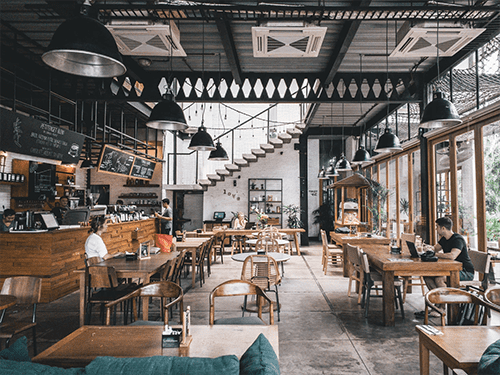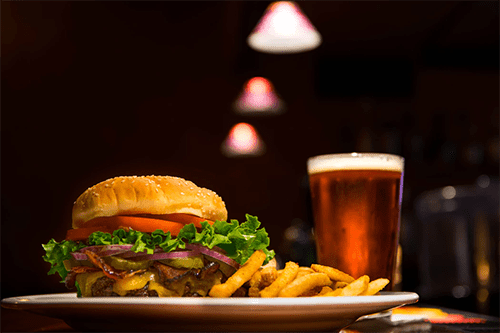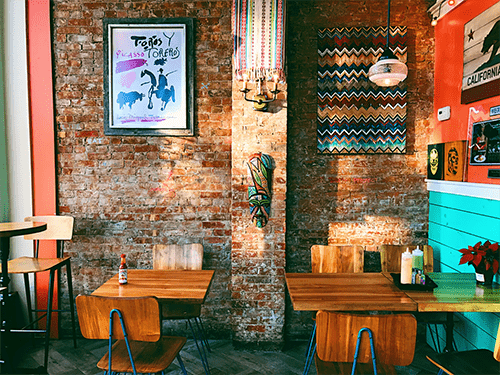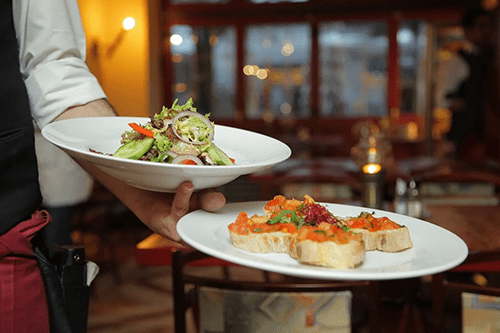How To Give Helpful And Effective Interview Feedback To Candidates
In this article, the workforce-management experts at Sling discuss the importanc...

As a restaurant manager, interviewing new employees can be a stressful situation. Many of the standard restaurant interview questions can be found online so candidates can prepare ahead of time to give the best answer. There’s nothing wrong with that. But do those answers necessarily translate into real-life skills and abilities? It’s hard to say.
To help you really get to know the candidate you’re interviewing, you’ve got to go deeper. To help you make the interview process easier, we’ve created a list of some of the most important restaurant interview questions.
These questions will help you avoid the canned answers that sound great in the interview but don’t truly reveal the candidate’s potential.

This question can help you understand the candidate’s reasons for wanting to work in your restaurant. Responses like, “I really enjoy making people happy!” or, “My friend said you have the best pay.” can tell you a lot about their motives.
This question can help you see whether or not the candidate is a team player. The answer they give can provide insight into their maturity level, how they handle stress, how they hold themselves accountable for problems, and their ability to deal with difficult personal situations.
What happens behind the scenes can have an effect on how your employee deals with customers. So if the employee has a tendency to hold onto grudges and harbor resentment for a coworker, that might be a red flag to let this one go.

The answer the candidate gives to this question can tell you a lot about their behavior should they get the job. The way they view hospitality will give you some insight into how they will respond to your guests.
The dictionary defines hospitality as, “the friendly and generous reception and entertainment of guests, visitors, and strangers.” The candidate’s response should be something similar — in their own words, of course.
If there’s too big a difference between the interviewee’s response and what you expect, they might not be the right choice for your restaurant.
Maintaining a healthy work/life balance is essential for food and beverage workers. It is extremely easy to burn out when you’re focused on customer service all the time. Having interests outside work can help your employees recharge after a difficult shift.
That’s why it’s important to find out what the candidate likes to do when they’re not working. The answers they give will help you see if they can maintain the busy life that comes with working in a restaurant.

This question can serve two purposes:
Are they happy when they tell the story? How much detail do they give? Do you feel like the candidate is being genuine?
How they tell the story, as well as the story itself, can give your further understanding about what hospitality means to them.
Talking about failures is much more difficult than talking about successes. Asking the candidate about their least favorite customer service experience can, again, serve two purposes.
First, it can help you see what bad customer service means to the candidate. Second, it can help you see how the candidate handles their mistakes. Do they take responsibility for the problem? Or do they make excuses?
The answer to this question can help you determine the candidate’s self-confidence. That said, it’s important that the strengths they mention be relevant to the restaurant industry. You want to hear things like:
A strength that has nothing to do with the restaurant industry — like being good with computers — indicates that the candidate might not be well-suited for this fast-paced environment.
The benefit of asking this question comes, not just from the candidate’s answer, but from how they deliver that answer as well. You certainly don’t want to hear that their greatest weakness is their temper — that doesn’t translate well to the busy restaurant environment.
But whatever weakness the interviewee does tell you about, do you feel they’re being honest and humble about it? Do they mention that they’re trying to work on improving that weakness?
The answer they give, as well as how they give it, can help you see what kind of an employee the candidate might become.

You’ll have your own policy for this issue, but asking a candidate how they would handle it can be a great indicator of how they might react under pressure. Before the candidate gives an answer, watch for a reaction.
Does the interviewee get nervous and tongue-tied, or do they stay calm and answer easily? This, too, shows how they will likely behave during a busy dinner shift when problems are coming fast and furious.
Asking this question can help reveal the candidate’s knowledge of the restaurant industry. Does the candidate’s answer use common restaurant terminology? Are they familiar with the ins-and-outs of serving customers?
Does the answer touch on why they want to work in the industry in the first place? Do you get the sense that the candidate is just there for the paycheck?
The response the candidate gives can help you get a sense of the person rather than just the employee.
This question makes a great follow up to “What is your favorite part of serving?” There are always parts of the job that people dislike: the schedule, the hours, the rush followed by the lull in activity.
But when a candidate’s answer to this question has more to do with things like being busy, demanding customers, and dealing with co-workers, it might be a red flag that this person isn’t right for the restaurant industry.
This is a great question to ask up-front because it indicates the candidate’s willingness to work. The candidate may give great answers to every other question you ask, but then tell you that they can only work between 8 a.m. and noon on Tuesdays and 1 p.m. and 8 p.m. on Sundays.
This is certainly not someone you want to try to work into your schedule, no matter their experience and skill level.

Asking a candidate how they define “team player” can help you gauge how they might fit in with your current employees. It can also help you see if they are willing to pitch in and help even if a task is outside their normal job description.
The candidate’s answer should indicate that they’re ready to work in whatever capacity and that they’re ready to be both a leader and a follower as necessary.
Customers can be difficult. It’s just a part of the restaurant industry. So when you ask the candidate this question, you’re more than likely to get an answer.
The important part is not the annoying things the candidate mentions, but how they handle those situations.
Leaving a low tip is one of the most frustrating things a server can encounter…especially after they’ve provided great service. But do they let that low tip affect that rest of the night, and potentially other customers?
If the candidate’s answer is brief, consider asking a more pointed question like, “How do you deal with those annoying things?” This will help you see how they react in a real-world situation.
This may seem like a basic question, but it can give you plenty of insight into the motivation of the candidate.
If they don’t have an answer, they probably just applied on a whim. If they do have an answer, they’ve obviously done some research or have first-hand knowledge of your business.
A great answer to this question is something like, “I’ve been coming here since you first opened and I’ve always loved the food and atmosphere. I get a great vibe when I’m here and I’d like to be a part of it.”
This shows that the candidate has a passion for what you have to offer and is motivated and engaged to lend their skills to making your business successful.
Unfortunately, prejudice runs rampant these days. You don’t want to find out after you’ve hired someone that they refuse to serve certain customers. This can cause problems on multiple fronts.
It can be difficult for your other employees who have to take up the slack. And it can cause problems for your business should word get out that a server or host or bartender has problems with specific groups of people.
Ask the employee directly if they’re willing to serve anybody and everybody who comes into your restaurant so you don’t have to deal with this problem after the fact.

If you’ve already asked why the candidate wants to work in the restaurant industry, it’s time to get specific and ask why they want to work at your restaurant.
A well-qualified candidate’s response will show that they have done their research, know about your business, and have a high level of interest. Expect to hear something like, “Your restaurant is known for X and is an attractive place to work for people who want Y.”
Their answer will also show that the job they are applying for matches the next step in their career growth.
In addition, listen for appreciation of your company’s mission and values as well as an expression of how the candidate can provide value to your business but also learn and grow.
An answer to this question gives you insight into what the candidate has to offer and is essential for making an informed decision. Asking why they think they would perform well at your restaurant helps you understand each person’s unique strengths, skills, and level of experience.
Armed with that knowledge, you can choose the best candidate — or candidates — that most closely match the unique needs of your restaurant.
The valuable thing about this question is that it often elicits a response that, while similar to the “greatest strength” question, is different enough that it provides a more complete picture of the individual you are interviewing.
The restaurant business is, by no means, an easy business in which to survive and thrive. Most work environments are full of high-pressure situations that can bring out the best (and worst) in your team members.
Those same high-pressure situations can also reduce the likelihood that a new hire will stay long enough to learn how to function in such a fast-paced environment.
Asking the interviewee what kind of work environment they are used to will help you understand whether they are well suited for your restaurant or not.
If you don’t get an informative answer the first time through, you may need to ask follow-up questions such as, “Tell me about a time when you had to deal with a high-pressure situation. How did you handle it?”
A good answer will tell you how well the candidate deals with stress and what strategies they use to cope with pressure at work.
Even the most punctual and dependable employee can be late every now and then. But asking this question can help you get a better idea of how the candidate will react when life throws them a curveball.
Did they exercise their problem-solving skills and figure out a way through the issue? Did they arrive late and then make excuses? Or did they prioritize punctuality and still make it to work on time?

Soft qualities like patience, organization, and flexibility are essential for those working in a restaurant environment.
As the one asking the questions, you know that, but it’s good to get the perspective of the potential new hire to see if their expectations match the realities of the job.
The answer to this question may reveal a lot about the person you’re interviewing, including such details as:
A good answer may include some explanation of what the interviewee can do to benefit and improve your restaurant.
Finding out what the person’s career goals are can tell you a lot about their work ethic, their potential, and whether or not they’ll make a good addition to your team.
If their career goals mesh nicely with the development track you’ve established in your restaurant — e.g., server to team manager to shift manager — they may feel better knowing there’s room for advancement.
It can also be beneficial for you, as a manager, to know whether or not your business can accommodate the interviewee’s aspirations and can help supplement the next question on the list.
Though it may seem like a very forward question, it can be useful to ask the interviewee how long they plan on staying.
You certainly don’t want to hear that they’re only going to stick around until they can find something better.
Working in a restaurant means handling food. Even positions that don’t handle food directly all the time may be asked to do so in an emergency.
It can be good to ask this question up front so you know if there’ll be a potential speed bump in the position for which they’re applying.
In some restaurants, tip sharing (or tip pooling) is an integral part of the pay structure.
For some people, though, it can be a point of contention that may cause issues if not dealt with right away.
Ask this question up front to see how the potential new hire feels about sharing their tips with the whole team.

It’s obviously not a question, but it’s a good way to get to know the person across from you. In fact, this is a great way to start the interview and encourage the interviewee to open up and talk about themself.
While their answer may start out being about their personal life, look for them to transition into how they got interested in the restaurant business, how they got started there, and where they hope their interest takes them.
Asking a potential new hire why they’re looking for a new job may help you get a feel for whether or not they would be a good fit in your restaurant.
Watch out for answers that may indicate that the interviewee is leaving (or lost) their current job because of things that occur in every business.
This may indicate that they’re not the right addition to your team.
This is a good question to ask to get a feel for how well the candidate might fit in with the current style under which your team operates.
As an example, if your team has a more collaborative style, someone who expresses an interest in working more on their own might not be a good fit.
This question can help you find out whether or not the interviewee is comfortable stepping into a leadership role should the need arise.
The answer they give can reveal their default leadership style — e.g., democratic, authoritative, laissez-faire, etc. — and how well it may fit into your current management system.
If the answer to this question is dramatically different from the responsibilities you deem essential for the open position, the candidate might not be the right person for the job.
That said, you can always train hard skills (like how to make coffee or how to be a food runner), but soft skills like organization and communication may be hard to find.
Don’t dismiss a candidate who is great with people just because they have less experience in a specific job.
You want your candidates to have a ready answer to this question because it can indicate their willingness to learn, be taught, and improve their skills and abilities.
Take note of how this skill can add value to your team. If you don’t get a good feel for this by the time they’re done answering, try asking a follow-up question or two to get more details.

Some people define success as pay and promotions. Others define success as working well together as a team. The list of such definitions literally goes on and on, but you’ll, no doubt, have a definition of your own.
Listen for an answer that is close to your own definition of success or one that works well with your established standards.
Ideally, you want the candidate to answer in such a way that indicates that they’re more focused on finding the right fit for their skills and abilities rather than a specific dollar amount.
Chances are, though, that you’ll hear lots of responses in the latter category. That’s okay, but don’t be afraid to ask follow-up questions, such as, “Would you be willing to work for X if the job was a good fit?” to get to the heart of the matter.
It’s perfectly acceptable for a candidate to be considering other jobs in addition to yours.
What might raise a red flag is if the jobs they are considering are all over the map in terms of industry and skill set.
For example, if they’re applying for a server position at your business but they’re also applying for a welder position at a local manufacturing business, it can indicate that they’re not fully dedicated to your industry.
This question acts as a supplement to the leadership question mentioned earlier. It can also reveal how an interviewee would handle low engagement and other difficulties on the job.
Would they step up and deliver a pep talk to the struggling team (or team member)? Or, would they grit their teeth and ignore the problem?
While many of the questions on this list can be used directly in — or customized for — a variety of different businesses, this question is industry specific.
If the candidate has any restaurant experience at all, they may have developed tricks, techniques, or methods to help them remember the details of the orders they take.
Finding out what those techniques are may reveal a great deal about the person and their potential in your restaurant.

There are few things more disruptive than being deep into a task and having to stop what you’re doing, switch gears, and conduct an interview with the restaurant interview questions listed above.
It’s not good for your productivity (because you’re distracted) and it’s not good for the potential employee you’re meeting.
The best way to prevent this distraction from happening is by using Sling to carve out time for interviews.
And instead of working right up until the last minute, use Sling to schedule 5-10 minutes on either side of the interview so you can review the restaurant interview questions and any notes you may have.
This can help you get into the proper frame of mind so you’ll be better prepared to conduct the interview to the best of your ability, find the right candidate for the job, and improve the way your team and your business operate.
For more free resources to help you manage your business better, organize and schedule your team, and track and calculate labor costs, visit GetSling.com today.
See Here For Last Updated Dates: Link
This content is for informational purposes and is not intended as legal, tax, HR or any other professional advice. Please contact an attorney or other professional for specific advice.
Schedule faster, communicate better, get things done.